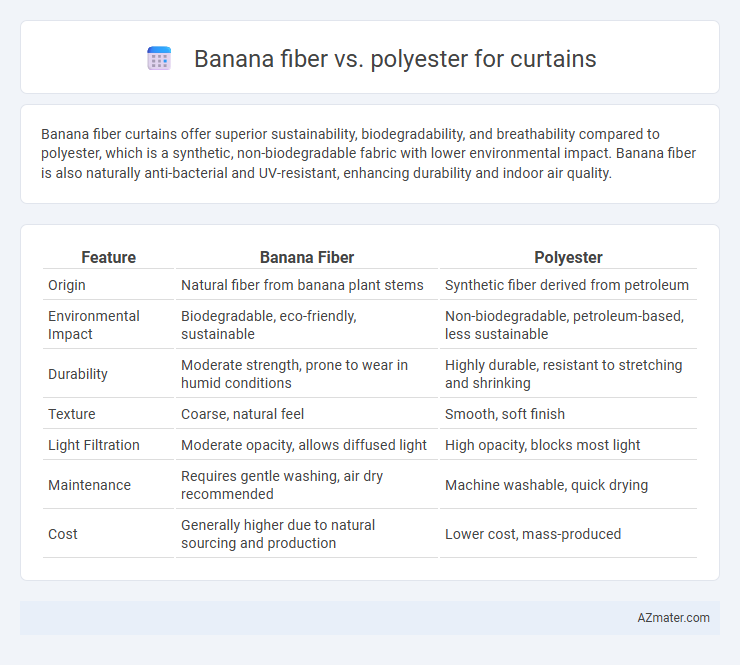Banana fiber curtains offer superior sustainability, biodegradability, and breathability compared to polyester, which is a synthetic, non-biodegradable fabric with lower environmental impact. Banana fiber is also naturally anti-bacterial and UV-resistant, enhancing durability and indoor air quality.
Table of Comparison
| Feature | Banana Fiber | Polyester |
|---|---|---|
| Origin | Natural fiber from banana plant stems | Synthetic fiber derived from petroleum |
| Environmental Impact | Biodegradable, eco-friendly, sustainable | Non-biodegradable, petroleum-based, less sustainable |
| Durability | Moderate strength, prone to wear in humid conditions | Highly durable, resistant to stretching and shrinking |
| Texture | Coarse, natural feel | Smooth, soft finish |
| Light Filtration | Moderate opacity, allows diffused light | High opacity, blocks most light |
| Maintenance | Requires gentle washing, air dry recommended | Machine washable, quick drying |
| Cost | Generally higher due to natural sourcing and production | Lower cost, mass-produced |
Introduction to Banana Fiber and Polyester Curtains
Banana fiber curtains, made from natural fibers extracted from banana plant stems, offer eco-friendly, biodegradable, and breathable qualities that enhance indoor air quality while providing a rustic aesthetic. Polyester curtains, crafted from synthetic polymers, are renowned for their durability, resistance to wrinkles and fading, and affordability, making them a popular choice for long-lasting window treatments. Comparing these materials highlights the sustainability and texture of banana fiber against the resilience and low maintenance of polyester in curtain applications.
Material Composition: Banana Fiber vs Polyester
Banana fiber, derived from the pseudostems of banana plants, is a natural, biodegradable material composed mainly of cellulose, hemicellulose, and lignin, offering eco-friendly and breathable properties for curtains. Polyester, a synthetic polymer made from polyethylene terephthalate (PET), provides durability, wrinkle resistance, and color retention but lacks biodegradability and breathability compared to banana fiber. Choosing between banana fiber and polyester hinges on prioritizing sustainability and natural texture versus longevity and low maintenance in curtain material composition.
Environmental Impact and Sustainability
Banana fiber is a biodegradable and renewable material derived from banana plant stems, significantly reducing landfill waste and lowering carbon emissions compared to synthetic fibers. Polyester, made from petroleum-based products, poses environmental challenges due to its non-biodegradable nature and contribution to microplastic pollution. Choosing banana fiber curtains supports eco-friendly production, sustainable agriculture, and promotes circular economy practices in home textiles.
Durability and Longevity Comparison
Banana fiber curtains exhibit exceptional durability due to their natural tensile strength and resistance to wear, outperforming many synthetic fabrics in maintaining structural integrity over time. Polyester curtains offer robust longevity with high resistance to stretching, shrinking, and wrinkling, making them a popular choice for long-lasting home textiles. However, banana fiber's biodegradable nature enhances sustainability without compromising durability, while polyester provides extended lifespan through synthetic resilience but with less environmental compatibility.
Aesthetic Appeal and Texture Differences
Banana fiber curtains offer a unique, natural texture with visible fibers and an earthy matte finish, creating a warm, organic aesthetic that enhances eco-friendly interiors. Polyester curtains provide a smooth, uniform surface with a subtle sheen, producing a sleek and polished look suited for modern or minimalist decor. The tactile contrast between banana fiber's coarse, rustic feel and polyester's soft, silky texture significantly impacts the overall visual and sensory experience of window treatments.
Breathability and Comfort Factors
Banana fiber offers superior breathability compared to polyester, allowing better air circulation and moisture absorption, which enhances indoor comfort by reducing heat buildup and humidity. Polyester, being synthetic, tends to trap heat and moisture, making it less breathable and potentially causing discomfort in warm or humid environments. Choosing banana fiber curtains improves airflow and provides a natural, soft texture that enhances overall comfort and a healthier living atmosphere.
Maintenance and Cleaning Requirements
Banana fiber curtains require gentle hand washing with mild detergent and air drying to maintain natural sheen and avoid fiber damage, offering eco-friendly biodegradability. Polyester curtains provide easy maintenance with machine washability, quick drying, and wrinkle resistance, ensuring durability and stain resistance for long-term use. Selecting between these materials depends on preference for sustainable care versus convenience and robustness in cleaning routines.
Cost and Market Availability
Banana fiber curtains typically cost more than polyester due to their natural origin and labor-intensive extraction process, but they appeal to eco-conscious consumers seeking sustainable options. Polyester curtains dominate the market with lower prices and widespread availability in various styles, making them the preferred choice for budget-conscious shoppers. The limited supply and higher production costs of banana fiber restrict its market presence compared to the mass-produced, cost-efficient polyester fabric.
Allergenicity and Health Implications
Banana fiber curtains are naturally hypoallergenic and resistant to dust mites, making them an excellent choice for individuals with allergies or respiratory conditions. Polyester curtains, while durable, tend to trap dust and can release microplastics and volatile organic compounds (VOCs), potentially aggravating allergies and respiratory issues. Choosing banana fiber over polyester supports a healthier indoor environment by reducing exposure to allergens and harmful synthetic chemicals.
Choosing the Best Fabric for Your Curtains
Banana fiber offers a sustainable, biodegradable alternative to polyester, providing natural breathability and a unique texture that enhances curtain aesthetics. Polyester curtains excel in durability, wrinkle resistance, and color retention, making them ideal for high-traffic areas and easy maintenance. Choosing the best fabric depends on your priority for eco-friendliness versus performance, balancing environmental impact with longevity and care requirements.

Infographic: Banana fiber vs Polyester for Curtain
 azmater.com
azmater.com